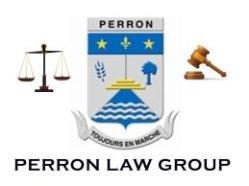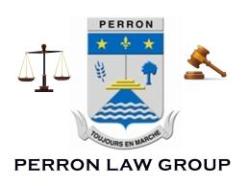A constant question in the mind of many attorneys is ‘how can I increase my billable hours while completing all these other tasks on my ‘to do’ list?’ – this is not a simple question to answer but there are a number of solutions that can be implemented into every practice to ensure more billable hours and more staff satisfaction at every level of the practice.
Delegate – to some this is a hard concept to grasp but when attorneys embrace the concept of delegation everyone benefits. Many staff want more responsibility and variety in their daily work tasks. By delegating different projects and tasks, support staff enjoy an increase their interest in their roles and feel more satisfied. Delegation of regular occurring tasks, scheduling, administration, follow up and routine activities frees up time for attorneys allowing more billable hours. Delegation is a learned skill; it does not come easily to most and must be handled in a way that both parties trust the process and each other. When delegation is practiced within a law firm it ensures career paths are created and skill sets are increased, this is beneficial for any growing firm.Â
Review – implementing monthly and annual reviews with all members of the law firm will allow every partner to keep a firm grasp on performance and activity of every staff member including paralegals, secretaries, technology support, communications and marketing staff. A monthly review may include a 30-minute meeting with each direct report to check performance against targets, outstanding issues, and project updates and staff morale. By checking in on a regular basis both partners and employees can recognise future opporunities and identify potential issues. An investment in annual reviews with each employee will also create career progression opportunities, identify training needs and help support staff feel more valued in their role. It is recognized that recognized and valued employees are more productive employees.
Happy Hour – conducing a regular ‘happy hour’ with your team members weekly or monthly will allow both parties to review tasks, projects and identify potential productivity challenges.

Measure – productivity can be measured by every practice through increased billable hours, increased client satisfaction ratings, increase in new cases and a feeling of more ‘control’ for partners. Support staff will measure their own productivity a number of ways. Firstly by their feeling of ‘completeness’ of all activities and tasks in their everyday ‘to do’ list. Secondly by the feedback from their superiors, feedback is an essential element to boost productivity in all staff members. Thirdly through their own job satisfaction. When a support staff member enjoys their work and environment they will be more productive.
Use Downtime – unfortunately we can’t eliminate downtime but we can be productive in times where things are not in our control. Being prepared for downtime will allow you to make the most of every opportunity. This simply means to be prepared. When you are waiting in offices, waiting for decisions to be made, waiting for communications, this can be frustrating. Eliminate the downtime and the frustration by regularly having a file of “down time to dos” – this file might include articles or journals you have been wanting to read, completing non-urgent paperwork, reviewing or editing documentation and replying to correspondence. Always carry a file in your briefcase that is filled with non-urgent tasks so you can make the most of these times. Get into the habit of taking this file with you when you leave your office, travel on public transport, attend meetings, arrive at appointments – keep it with you.
Systemize – many activities in each practice can be documented and systemized. This initial investment of time and resources to achieve this may seem difficult, but the long-term rewards far outweigh the initial costs. If your team doesn’t have this skill set internally, consider outsourcing this to a Productivity or Organization Expert. These people can quickly identify tasks and activities that can be systemized; they can document the processes and train the staff on how to implement them.
Be flexible – implement a company policy that rewards not only good performance but productivity as well. Identify within each role in your practice where people can be productive, this will be different for each role and each team member. Some people are more effective working early mornings and others late at night. Investigate if some of your team members can have flexibility in their work environment to really maximize their performance. Identify if there may be opportunities for them to be measured on their outcomes rather than the time they sit at their desk or cubicle. Flexibility is great recognition for high performers: it rewards productivity and outcomes rather than office hour attendance.
Reward – consider implementing a reward system for high profile or long-term cases. Within each practice there are opportunities to share the rewards. Many support staff will increase their productivity when recognized for their efforts. These rewards do not always need to be monetary (although that is always appreciated) but can include gift cards, time off, gifts and praise. Take time to recognize your support teams.
Educate – one of the most effective uses of your resources is to invest in productivity training or workshops for your support staff (and partners). Many experts can give practical solutions and tips in short workshops that are designed to maximise the skills and efforts of each of your team.
Apply any or all of these tips today and you will definitely notice an increase in the support staff productivity, billable hours and increased client satisfaction.
About the author
Neen is a Productivity Expert: by looking at how attorneys spend their time and energy – and where they focus their attention – Neen helps you develop productive business development strategies and increase performance. A dynamic speaker, author and corporate trainer, Neen demonstrates how boosting your productivity can help you bill more hours. With her unique voice, sense of fun and uncommon common sense, Neen delivers a powerful lesson in productivity.www.neenjames.com






 Are Lawyers Fascinating?
Are Lawyers Fascinating?

 Globally, every California attorney and paralegal shall adhere to Business & Professions Code (BPC) §§6450 through 6456. There are no exceptions. There are additional ethical considerations for an attorney when contracting with a virtual paralegal. This article will discuss BPC §6450, and the ethical use of “employee” and “virtual” paralegals.
Globally, every California attorney and paralegal shall adhere to Business & Professions Code (BPC) §§6450 through 6456. There are no exceptions. There are additional ethical considerations for an attorney when contracting with a virtual paralegal. This article will discuss BPC §6450, and the ethical use of “employee” and “virtual” paralegals.


